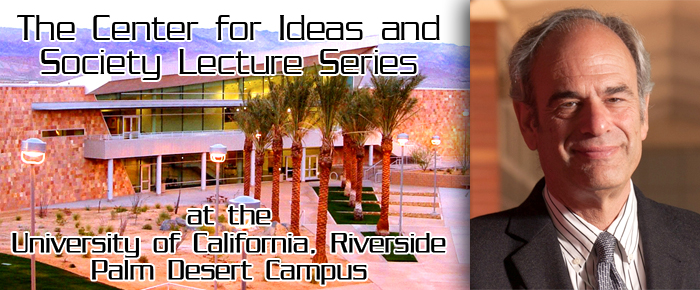
By Heidi Simmons
Would you want to live forever? This was the question posed at the opening event of the Center for Ideas and Society Lecture Series held at UCR’s Palm Desert campus.
John Fischer, UCR Distinguished Professor of Philosophy and Director of the Immortality Project, never asked for a show of hands from the predominantly mature audience of 135. Attendees, maybe for the first time, considered what immortality might mean and that it could be in the realm of possibility.
“Think of yourself living a thousand years into the future,” said Fischer. “Would this be a choice you would make?”
With a $5 million grant from the John Templeton Foundation, UCR has begun to look seriously at the reality of immortality and what that might mean for individuals and society. The grant money will be spread across three academic disciplines: science, philosophy and theology.
“The possibility of immortality will come from biology,” said Fischer. “It would be a medically induced immortality where we could stop disease and ageing.” More than half of the grant is invested in science and empirical data.
Biologists involved with the project are studying the Hydra, a small fresh water creature that has regenerative abilities, and appears to not age or die!
As a philosopher, Fischer thinks in terms of how life will be lived and the consequences to living forever. He divides the thinking onto three groups: The optimists, who see immortality as a good thing; the pessimists, who don’t think it’s such a good idea and the curmudgeons, who believe eternal life would become boring.
Fischer puts himself in the pessimists’ group, “I don’t think immortality would necessarily be desirable. And I just don’t think it’s necessarily undesirable.”
Immortality may be all about the quality of life. Fisher discussed the possibilities of what the world might look like if everyone on the planet had the option to choose to live forever.
Optimists believe the world would improve and the problems that exist would be solved. Pessimists think the world would be over-crowed and there would be a strain on natural resources. Curmudgeons consider immortality unpleasant and pointless, “This world’s not so great, the next world is better.”
“If we live forever, we would have many different lives,” Fischer said. “We would change as people over and over again. There would not be the same stages in life like we have now.” Fischer added, “As human beings we are driven to manage our terror of death.”
“As a philosopher, I chip away at the consensus that immortality couldn’t be choice worthy,” said Fischer. “I don’t think that’s so obvious.”
The immortality project is studying the esoteric and the existential concerns of immortality. Included in the research are the near-death experiences and the persistent notion of the after-life.
“Something exists deep in human nature that makes immortality not choice worthy,” Fischer said. “Because the values of life or the meaningfulness of life or the compelling quality comes from death, from limitation. We don’t have endless time or opportunities.”
But Fischer confirmed that lasting –- in the case of immortality, everlasting –friendships and deep personal relationships cannot be reduced to factors that can run out over time. “What we get out of friendships and other personal relationships is not primarily, and certainly not exclusively something cognitive,” he said. “What we get out of relationships is transformative and uplifting.”
By the questions asked in the audience, it appeared that those attending were equally divided. There were those who want to live forever, those that don’t and those who will give it more thought and choose when the time comes, assuming of course the option becomes available.
Whether immortality is choice-worthy or not, what’s truly exciting is that academia has decided that immortality is worthy of study. Immortality is not a new concept. Many religions have promised immortality in some shape or form.
It will be fascinating as the research is compiled just how much immortality and the belief in immortality will be relevant to how we live our lives in the present.
The topic for the lecture series is a focus on The Things Money Can’t Buy. With the topic of immortality covered, it’s only fitting that the next lecture, February 11, will be on Longevity. Titled “More Precious than Gold: The Paths to Long, Richly Rewarding Lives,” will be given by Dr. Leslie Martin, Professor and Chair of Psychology at La Sierra University.
March 5’s subject is Democracy. This lecture will discuss finding peace in a post-Cold War world. At the podium for this event will be UCR’s Executive Vice Chancellor and Provost Paul D’Aniere, a political scientist whose expertise is in Eastern European and post-Soviet affairs. He will share his thoughts on whether a new cold war is emerging and what that means for the world.
The series concludes March 11 with Ethics. Eric Schwitzgebel, Professor of Philosophy at UCR will deliver “A Theory of Jerks.” This is certain to be fun as Schwitzgebel explores the nature of “Jerkitude” and what to do when confronted with a jerk. He will also talk about their opposites – Sweethearts.
The Center for Ideas and Society Lecture Series is an interdisciplinary research center dedicated to advancing humanistic studies and creativity at UC Riverside. According to the website, “The lectures are a way to illuminate the ways in which human beings create and explore a distinctly human life.”
Lectures begin at 6:00 pm and are held at the UCR Palm Desert Campus 75080 Frank Sinatra Drive. The events are free, but a reservation is requested. To RSVP go to palmdesert.ucr.edu/programs/events.html. For more information call 760 834 0800.








































